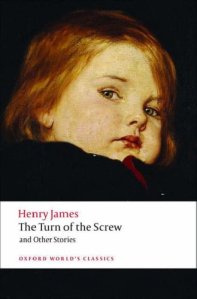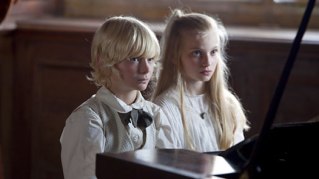Main themes. History of critical interpretations. Best movie adaptations.
It’s the beginning of Summer and the newspapers show me shocking pictures. On page one I see the Iraqi horror and the advance of a (political and religious) radical ideology, while on page two I read about the local crime news, the new impeccable, model father/son who slaughters his wife and children in order to regain an imaginary freedom. Mister Hyde is among us but these days I am fortunately rereading Henry James’s The turn of the screw.
I read it for the first time in June 2003 in Venice. I remember the circumstances. I was sunk into an armchair by a window overlooking the Frari church and could not take my eyes off the page in spite of the suffocating heat. I now reopen the book after eleven years – once again at the beginning of Summer, a sinister similarity with the story – and I hope to feel once more that emotion which made me writing countless marginal notes.
Probably, everything has been already written about The turn of the screw and I will only advise you to read the book if you haven’t yet. Since its first printing in 1898, this short story has aroused a number of critical studies and searching on Google you will also find the history of its critical interpretation. “The turn of the screw is the most hopelessly evil story that we ever read in any literature, ancient or modern”, so wrote The Independent on the 5th of January 1899. Is it really? For its essential universality, I think it is.
The plot follows the tradition of the uncanny and the gothic novel. It is nestled in a short narrative frame, a literary device which instills doubt about what will be said later. This frame looks a bit like our Italian Decameron. Some friends gather by the fire in an old country house in order to tell horror stories. The unknown narrator is our eye witness. We know nothing about the stories until we open our book and a charming man, Douglas, takes the floor about horror stories concerning children. He says he knows the most terrible, true story ever heard. “It’s not the first occurrence of its charming kind that I know to have been concerned with a child”, says Douglas. “If the child gives the effect another turn of the screw, what do you say to two children?” Everyone is now interested. “We want to hear about them!”, they shout. But Douglas makes them be quiet. The story is contained in a manuscript that a woman now dead gave him twenty years before. The manuscript is under lock and key and it will take a couple of days to recover it. I imagine you are already hearing a sinister fairy voice inside yourself: “Once upon a time there was a man who was listening to another man who was reading a manuscript written by a woman who was telling her own story…”. But soon the story really begins. Obviously, it is our witness who tells us about Douglas reading the manuscript. And the manuscript – our story! – was written by a governess many years ago.
A young woman of twenty – inexperienced, daughter of a country parson – answers to a job offer in London. A businessman is searching for a governess for his nephew and niece in the great country estate of Bly. He has been given custody of the orphans but doesn’t intend to deal with the matter himself. The job is well-paid but there’s a single important condition. The governess will be charged with every responsibility from the children’s education to the economic issues, because the master doesn’t want to be bothered. Never, and for no reason.
Thus the story opens with her being alone. The girl is fascinated by this handsome and influent bachelor she cannot speak with. She doesn’t want to delude the man and secretly fancies to seduce him. So she accepts the job and moves to Bly. A wonderful mansion, immersed in a languid and insolent Summer, receives her. She makes the acquaintance of Flora, an eight-years old child of angelic beauty, and after a few days young Miles comes home after the school-year. He is ten and above all cheerful, intelligent, an beautiful. However, the governess believes that he harbors a secret. The reason is the delivery of a strange letter in which the school headmaster says that Miles has been expelled. The girl is profoundly troubled. Is the child evil? What has he done to be expelled from school?
The doubt worms its way in Bly while Summer moves forward its heart of darkness. Strange things begin to happen. The girl sees a mysterious man on the tower, then the same man appears framed by a window and also an horrible woman presents herself. The apparitions come in succession leading the governess to despair. Who are these figures? They look at her with evil eyes until the girl confides the whole matter to Mrs Grose, a faithful servant who recognizes the features of the man – handsome, erect, with red hair – as Peter Quint, a dead servant. The second figure is thus identified with Miss Jessel, the prior governess and Quint’s lover.
Thus the girl has no doubts, the ghosts of the perverted – or free, if you prefer – couple have come to corrupt the children. They have come back “to corrupt and possess” them, whatever meaning you want to give to these words. Some servants also say that Peter Quint used to spend too much time with Miles, a habit which was not appropriate for a young gentleman. The unsaid conjectures and the exaltation of the governess reach the climax when she decides to protect the children, to put herself between them and the ghosts and thus to face the evil directly. She commits to the salvation of the children and on this battle field – real or invented? – a tragedy will take place. Henry James will utter just a few words on the matter, bringing silence back to the governess’s mind and to the estate of Bly.
Then it is obvious that what counts in The turn of the screw is not the story but what is not said. In 1934 the famous essay by Edmund Wilson titled The ambiguity of Henry James stated a Freudian interpretation for the first time. It undermined the governess’s credibility and aroused furious reactions. Who dared to distrust a girl who embodied the values of the society? In fact, under Wilson’s perspective the ghosts are not real but projections of the governess’s frustrated desires. These desires are triggered by the sensuality of Summer, by the isolation of Bly, and by that “sense of liberality” and freedom she experiences for the first time in her life. And they are obviously directed firstly to the master and then to young Miles, to whom we think immediately when we remember that it is Douglas who speaks. Yes… I know you had forgotten Douglas, but isn’t inevitable to ask how did he know the governess during his childhood?
What is certain is that Henry James managed to build a story on omissions – that ambiguity mentioned by Wilson – and above all to establish a 360-degress critic of the Victorian society. The governess’s tendency to repression and projection obviously makes the reader fill the gaps with sexual references. The mechanism ends up unmasking Victorian pruderie. Social incorruptibility and hypocrisy appear then as the real, greatest perversion.
I watched the most famous TV and cinema adaptations of The turn of the screw (watch the most recent at the end of this article!), but in my opinion the written text still is unsurpassed. The reason is that Henry James has represented the very acts of thinking, speaking and writing. Language is the vehicle for rationalization thus language is the means for the perpetration of private and social repression. It is in this description of the thinking machinery – the governess fancies, fancies… and always fancies – that we find the differences between reality and dream. Henry James deserves to be read more than watched because no movie can put ourselves in such an uncomfortable position. Indeed, the book puts under our nose that innate mechanism through which we always choose our prejudice. Henry James points at this choice. The choice is always possible, he says. Don’t pretend it is not true. You choose to believe or not to a ghost, to believe or not to its evil nature, to believe or not that you are right. Always. Thus every moral risks to become totalitarian.
Then Henry James’s personal biography highlights another important subtext. Oscar Wilde had spoken about “the love that dare not speak its name” but Henry James influences the reader to such extent that it’s impossible not to interpret the tragedy as the suffocation of the intellectual – and the homosexual – in the Victorian society.
What is certain is that we all potentially are Miles and Flora, innocent or blameful victims depending on the eyes of the observer. We all potentially are Peter Quint and Miss Jessel, depraved or simply free. E above all, we are the puritan governess who embodies the hypocritical and tyrannical society we ourselves build.
The turn of the screw by Tim Fywell, with Michelle Dockery. BBC film adaptation, 2009.
The turn of the screw by Dan Bolt, with Colin Flirth and Jodhi May. TV movie, 1999.


